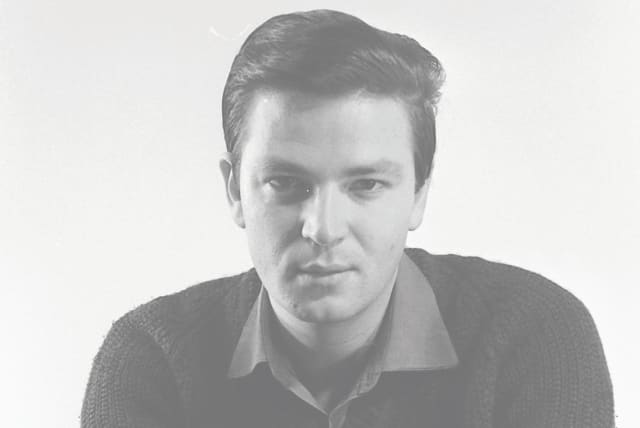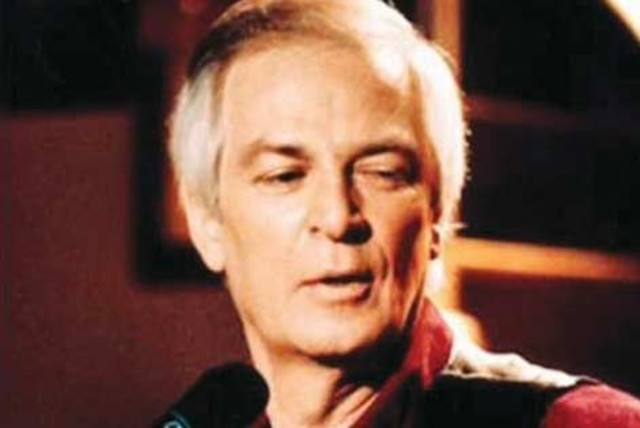Israel-Hamas war: 18 Arik Einstein songs to listen in time of war, loss

Arik Einstein has always provided a soundtrack for Israeli life, and his work is relevant now more than ever during this time of war and loss in Israel.
If only Arik Einstein were here.
If only he could sing to us, comfort us.
But it’s been exactly 10 years since Einstein, one of the most beloved of Israeli musicians, passed away suddenly at the age of 74. Israeli fans have been missing him ever since, but the longing for his soothing voice is stronger than ever these days, given the ongoing war.
Einstein was known as a modest man, an Israeli who never owned a cellphone, who lived most of his life in a small Tel Aviv apartment where he grew up, and who preferred to sing for friends in the studio than to perform at concerts.
It’s a struggle to describe him to those who don’t know who he was, but the best I can come up with is that he was some combination of Paul McCartney, Frank Sinatra, and Pete Seeger rolled into one. He had extraordinary charm and when he sang, it was as if he were speaking each word from his heart, not just reciting lyrics he had memorized. He wrote the lyrics for many of his songs and collaborated with the greatest Israeli musicians and poets. But no matter who got the credit, every song he sang was an Arik Einstein song.
He had movie-star good looks and appeared in a number of films, but his career took off when the movie industry was in the doldrums. Had it been stronger, he would have been Israel’s greatest star as well as its greatest singer.In normal times, there would have been many tribute concerts to Einstein, but those will come after the war. Meanwhile, KAN 88 FM is featuring tributes to him starting on Sunday and continuing throughout the week.
I have selected, in no particular order, 18 of his songs that I believe make for the most appropriate soundtrack for this time of war and loss. He has always provided a soundtrack for Israeli life, and his work is relevant now more than ever.
Timely Arik Einstein songs to listen to during the war
- “How Good That You’ve Come Home” (“Kama Tov Sheh Bata HaBayita.” Lyrics: Yankele Rotblit, music: Shalom Hanoch) – this 1971 song became the unofficial anthem of the movement to free soldier Gilad Shalit from Hamas’s captivity. It’s a typically warm Einstein tune, sung with great expression, about welcoming a friend home. It’s the chorus and the music that put this song at the top of the list. When you listen closely to the lyrics, it reveals some ambivalence on the part of the singer, who chides the listener for not even sending home a postcard from his travels. But the chorus carries it, especially right now.
- “Me and You” (“Ani ve Ata.” Lyrics: Arik Einstein, music: Miki Gavrielov) – perhaps the ultimate Israeli peace song, this tune expresses the hope that two people who care can change the world. “Me and you will change the world/Me and you, then everyone will come/It’s been said before me, it doesn’t matter/Me and you will change the world.” Cynics might think these words, sung so meaningfully, are no longer relevant, but they remain moving.
- “Fly Away Little Bird” (“Oof Gozal.” Lyrics: Arik Einstein, music: Miki Gavrielov) – literally a song about an empty nest, this is sung from the point of view of a goose saying goodbye to his gosling as he leaves home. While that may sound silly, this is one of the most beautiful and most frequently played songs from Einstein’s entire canon, and it could bring tears to my eyes long before October 7. Since October 7 however, there is no way to listen to this song without thinking of the victims and the hostages, as the father warns his son to beware of the “vulture in the sky.” It is one of the most evocative songs about the joys and pains of being a parent.
- “Go Slowly” (“Sa Liat.” Lyrics: Arik Einstein, music: Miki Gavrielov) – this gentle, meditative song about the thoughts that pass through the singer’s head on a long, rainy nighttime drive with a friend represents one of Einstein’s triumphs as a lyricist, and may reveal his personality more than any other song he ever recorded. Along the road, the driver’s friend, Tzvi, obviously based on Einstein’s close friend, Tzvi Shissel, talks as they listen to the radio, making Einstein think about soldiers who are trying to sleep in the mud, fans of his beloved HaPoel soccer team eating their hearts out over another loss, and his lover back home. Interestingly, this is one of the only Israeli songs to actually mention Gaza: “Tzvi says they’ve discovered a planet where there is life/And I think, in a little while, we’ll be by Gaza/And if only they don’t throw some grenade and we’ll go to hell.”
- “The Ballad of Yoel Moshe Salomon” (Lyrics: Yoram Taharlev, music: Shalom Hanoch) – Einstein recorded songs from many genres, including classic Zionist tunes, and he has an album called Good Old Land of Israel. This song was inspired by the story of a visit Salomon made to Petah Tikva in the 1870’s with a group of businessmen, and discovers that it doesn’t look very promising. The others flee, but Salomon stays the night and is rewarded in the morning when he hears a bird singing. It’s so charmingly sung that even little kids like it, not realizing they are getting a history lesson.
- “Saturday Morning” (“Shabbat B’Boker.” Lyrics: Tirza Atar, music: Yoni Rechter) – this is a song for children about a relaxed Saturday morning. You feel like you are right there in this happy, safe family scene, and it’s particularly soothing and sad now.
- “Brow Adorned with Black Gold” (“Atur Mezach Shahur Zahav.” Lyrics: Avraham Halfi, music: Yoni Rechter) – a gorgeous harmony from a poem set to music, best known for a performance in which Einstein sang it with Yehudit Ravitz and Corinne Allal.
- “Take a Break” (“Pesek Zman.” Lyrics by Arik Einstein, music: Shem Tov Levi) – an especially apt song these days about taking a break from tension and looking at the sea without thinking. “Maybe it’s just a small crisis, and it will pass/Maybe I just got a little tired... The soul just wants a little rest.”
- “What Do the Deer Do” (“Mah Ohsot Ha Eyalot.” Lyrics: Lea Goldberg, music: Arieh Levanon) – this is a Lea Goldberg poem set to jaunty music. The sheer cleverness of the rhymes – the whole song is a playful series of intricate rhymes – is like a celebration of Hebrew’s beauty. For kids, it’s also actually a meditation on what those deer do at night. A song that works for everyone.
- “Maybe It’s Over” (“Ichol L’hiot Sheh Zeh Nigmar.” Lyrics: Yehonatan Geffen, music: Shem Tov Levi) – a bittersweet song about reconciling Zionist fantasies with the reality of Israeli life. The chorus is, in part, “They say people were once happy here before I was born/That everything was simply wonderful before I got here.” It’s a sentiment he grew up with, but I think everyone who immigrates to Israel can relate to this feeling of being told you missed out on the era when life here was paradise.
- “Guitar and Violin” (“Guitara ve Kinor.” Lyrics: Arik Einstein and Shalom Hanoch, music: Shalom Hanoch) – this is one of Einstein’s later songs and it’s a little story about a couple, both young musicians who live together, in a small, dark apartment, but one filled with love. When I hear the stories of young couples who were killed at Nova’s music festival, I think of this song and how they should have gone back to their little paradise in the middle of the city, but tragically were unable to.
- “We’ll Meet Again” (“Od Nipagesh.” Lyrics: Arik Einstein, music by Shem Tov Levi) – as night falls, a man thinks about a woman he misses. “Everything is here, but you’re not/You’re going through difficult times/How do you take care of yourself, and what about your smiles?” It’s about longing for a reunion when you worry about what someone else is going through.
- “Avshalom” (Lyrics: Arik Einstein, Uri Zohar, Yonatan Geffen, Boaz Davidson, Tzvi Shissel, and Shalom Hanoch, Music: Shalom Hanoch) – some of the most creative minds of the Tel Aviv bohemian scene collaborated on this song, which was written for Zohar’s son, Avshalom. It begins like a fairytale, but ends by telling the boy that he is the hero of the story. The chorus is, “Why not? Why not now? What will surely come tomorrow.”
- “Why Do I Take It to Heart” (“Lamah Li Lakahat Le’Lev.” Lyrics: Arik Einstein and Shalom Hanoch, music: Shalom Hanoch) – this is one of many songs in which Einstein seems to be trying to encourage an adolescent, or maybe speaking to the adolescent part of himself. “Let yourself live/Let yourself make mistakes/Let yourself forgive/Just to love.”
- “San Francisco on the Water” (“San Francisco al ha Mayim.” Lyrics: Arik Einstein and Shalom Hanoch, music: Shalom Hanoch) – this is a very heartfelt song with lyrics about sitting by the bay in San Francisco and missing Israel. Einstein sings about the beauty he sees and watching Dr. J. (former US professional basketball player Julius Erving), and Kareem Abdul-Jabbar playing basketball, but how he also feels alone there, longing to be back home.
- “Three-Four and to Work” (“Shalosh-Arba ve le’Avoda.” Lyrics: Arik Einstein, music: Shem Tov Levi) – this is a light-hearted song that affectionately pokes fun at an exercise radio program, telling people they have to go to work, and then also “go to love.” It reminds me of the spirit of volunteerism we’ve seen since the war started.
- “I’m Filled with Love and It Will Win” (“Yesh Bi Ahava ve Hee Tinatzeach” Lyrics and music: Arkadi Duchin) – simply a sweet song about how, in spite of life’s pressure and suffering, he still feels love that radiates toward the world.
- “Song from After the War” (“Shir Shel Ahri Ha Milhama.” Lyrics: Arik Einstein, music: Shem Tov Levi) – the words say it all, “A song of a lover, waiting for you... This is a song after the war, it always reminds me of hope.”
Jerusalem Post Store
`; document.getElementById("linkPremium").innerHTML = cont; var divWithLink = document.getElementById("premium-link"); if (divWithLink !== null && divWithLink !== 'undefined') { divWithLink.style.border = "solid 1px #cb0f3e"; divWithLink.style.textAlign = "center"; divWithLink.style.marginBottom = "15px"; divWithLink.style.marginTop = "15px"; divWithLink.style.width = "100%"; divWithLink.style.backgroundColor = "#122952"; divWithLink.style.color = "#ffffff"; divWithLink.style.lineHeight = "1.5"; } } (function (v, i) { });

